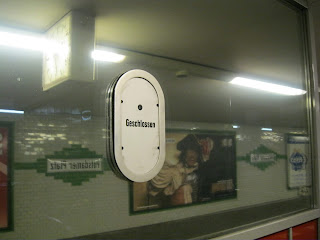
Olympia, a student of mine, loves Rilke, and inspired by "Herbsttag", using it as a template, she wrote her own poem, titled "Wintertag".
Here we go.
Herbsttag
Rainer Maria Rilke
Herr: es ist Zeit. Der Sommer war sehr groß.
Leg deinen Schatten auf die Sonnenuhren,
und auf den Fluren laß die Winde los.
Befiehl den letzten Früchten voll zu sein;
gib ihnen noch zwei südlichere Tage,
dränge sie zur Vollendung hin und jage
die letzte Süße in den schweren Wein.
Wer jetzt kein Haus hat, baut sich keines mehr.
Wer jetzt allein ist, wird es lange bleiben,
wird wachen, lesen, lange Briefe schreiben
und wird in den Alleen hin und her
unruhig wandern, wenn die Blätter treiben.
Wintertag
Olympia T.
Winter,
Sei kurz und milde
Und lass uns deine Schönheit genießen
Gib uns sonnige, schöne Tage
Sodass unsere Haut
Endorphine produzieren kann
Halt die Straßen offen und sauber
Sodass wir unsere Fahrräder
Benutzen können
Und schließlich:
Bereite dich gut vor
Auf den nächsten Frühling

At one point early in their studies, German students grow more and more irritated with certain words that stick in sentences without an obvious purpose. The word doch is one of them.
People say, "Trink doch!" when "Trink!" would do.
Du kannst doch um 10 Uhr zur Party kommen. Why not just um 10 Uhr? The party will be great without the doch.
Other words of this kind are:
etwa
Hast du etwa die Fenster geputzt?
denn
Wohin gehen wir denn?
bloß
Sag bloß, du willst wieder ins Berghain gehen?
These words have a main job with a real meaning (doch means but, etwa means approximately, denn means because), but here, they take a second job. Here, they belong to a group of words, called "die Partikel" (plural: die Partikeln).
A Partikel (yes, it means particle) is a word that does not change – no inflection, neither different genders nor different endings, no conjugations – sounds like utopia, doesn’t it? Most common are the prepositions (in, auf, an, über, neben etc.)
In many cases we use a particle to emphasize certain parts of the sentence. In the examples above, the words etwa, denn and bloß express surprise or astonishment or curiosity, and in the case of the Berghain-goer a hint of criticism.
The particle doch works as an intensifier. The person who encourages you to drink, really wants you to drink. The doch says, "Drink for Christ’s sake and don’t be shy".
There are many intensifiers. They show up when the speaker is excited. In the German grammar vocabulary they are called Intenistätspartikel which sounds like a neutrino running wild. The German language recruits intensifiers from all types of words. Many of them are adjectives in their normal lives.
unheimlich (creepy), here: incredible
unglaublich (unbelievable)
ungewöhnlich (unusual)
wahnsinnig (mad), here awsome, incredible
Stretch the a to a waaaahnsinnig and you say "incredibly incredible".
irre (mad, crazy), here: incredibly incredible
total (totally)
ausgesprochen (distinct)
Simple particles are at hand, when you don’t want to exaggerate too much:
sehr
ganz
ziemlich (rather)
Each young generation creates its own intensifiers.
Two or three years ago, the word "krass" (extreme) was popular among the young in Germany. The generation before favored "cool". The word "geil" (lecherous, horny) lasted almost a decade until the mid 1990s and was extensively used by youth and children alike to tell everybody how enchanted they were.
Most popular among English-speakers seem to be the familiar "super!" and, of course, the evergreen "wunderbar".

